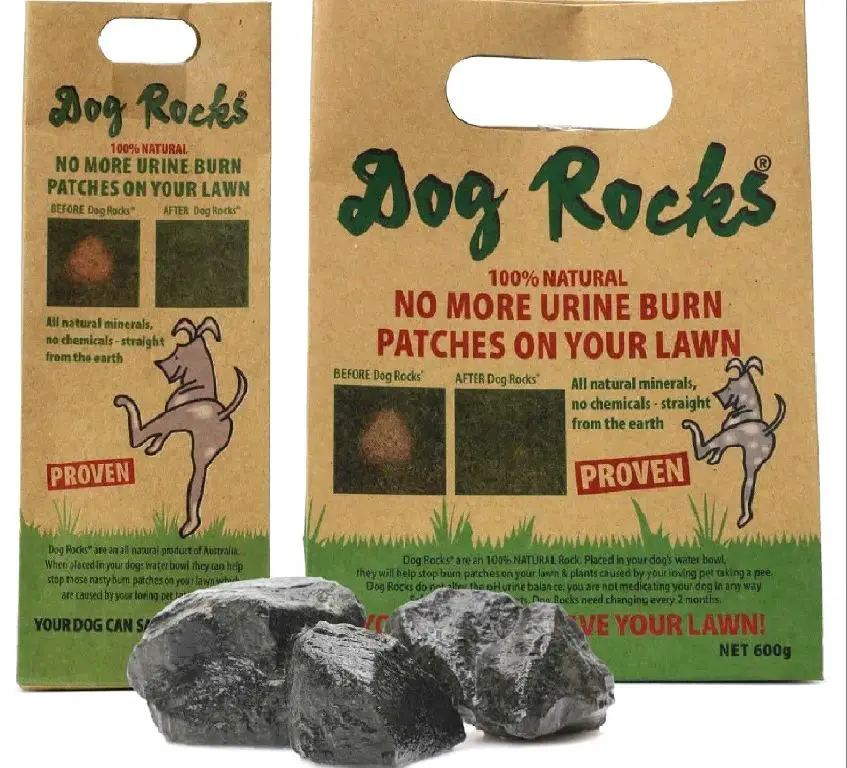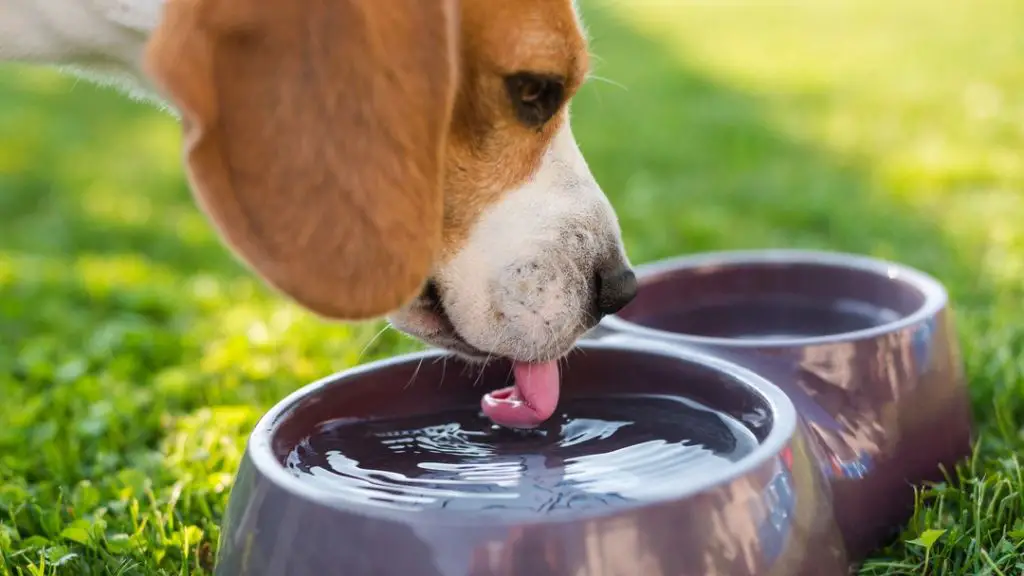What are Dog Rocks?
Dog Rocks are a brand of mineral supplement marketed for dogs. They contain zeolite, which is a mineral that absorbs ammonia. The goal of Dog Rocks is to reduce lawn burn that can be caused by nitrogen in dog urine.
When a dog urinates on a lawn, the nitrogen in their urine can build up in the soil and cause the grass blades to burn and turn yellow or brown. Dog Rocks contain zeolite to bind to some of the nitrogen before it hits the grass. This aims to prevent discoloration and damage to the lawn.
Dog Rocks are small gravel-like supplements that are added to a dog’s water bowl or food. As the dog drinks the water or eats their food, they ingest the Dog Rocks. The zeolite inside the Dog Rocks absorbs ammonia within the dog’s digestive system before it reaches the urine. This results in less nitrogen being excreted in their urine.
How Do Dog Rocks Work?

Dog Rocks contain zeolite, a natural mineral that attracts ammonia molecules. When a dog urinates on grass, the nitrogen in their urine can convert into ammonia. This ammonia accumulates in the soil and causes grass burn, leaving unsightly brown patches in the lawn.
Dog Rocks use the zeolite mineral to trap ammonia molecules before they reach the grass. When a dog drinks water containing Dog Rocks, the zeolite attracts and binds to the ammonia in their urine. This prevents the ammonia from traveling through the dog and being deposited onto the lawn.
By trapping the ammonia within the zeolite structure, Dog Rocks help reduce the nitrogen content in dog urine. Less ammonia reaches the grass, which protects the lawn from burn spots. The zeolite passes through the dog’s system harmlessly, allowing Dog Rocks to continually work with every drink of water.
Potential Benefits of Dog Rocks
Some pet owners claim Dog Rocks provide benefits for dogs and lawns. However, these potential benefits should be weighed carefully against any potential risks.
One claimed benefit of Dog Rocks is they may reduce lawn burn from dog urine. The minerals in Dog Rocks are said to neutralize compounds like nitrogen in dog urine that can discolor or damage grass. This could help dog owners maintain greener, healthier lawns.
Another potential benefit is Dog Rocks may make dog urine less smelly. The minerals may neutralize some of the odorous chemical compounds in urine. Less odor could be preferable for households with dogs.
There are also claims that Dog Rocks may support urinary tract health in dogs by promoting optimal pH levels. However, there is no scientific evidence to support this benefit.
While these potential benefits sound appealing, pet owners should carefully weigh them against the potential risks of using Dog Rocks or similar products. Consulting a veterinarian is advisable before using urine-altering products in dogs.
Potential Risks of Dog Rocks
While many pet owners report success with Dog Rocks, there is minimal scientific research on their safety and efficacy. Some potential risks to be aware of include:
Dog Rocks contain trace minerals and zeolites. If directly ingested in large quantities, there is a small risk of gastrointestinal blockage. Ensure your dog does not have direct access to the Dog Rocks.

The mechanism by which Dog Rocks work could theoretically interfere with some medications. Consult your veterinarian before use, especially if your dog is on diuretics or urinary medications.
There are not many peer-reviewed studies on the safety of prolonged use in dogs. More research is needed on the potential long-term effects.
Dog Rocks are not a cure-all solution. They do not address underlying health conditions that could contribute to persistent urinary issues. Proper veterinary care is still recommended.
While many customers are satisfied with Dog Rocks, individual results may vary. Monitor your dog closely and discontinue use if any adverse effects occur.
Can Dog Rocks Cause Bladder Stones?
There is currently no scientific evidence that directly links Dog Rocks to an increased risk of bladder stones in dogs. Dog Rocks work by absorbing minerals from the water that dogs drink, aiming to reduce lawn burn marks. This process does not fundamentally alter the composition of a dog’s urine in a way that would promote stone formation.
That said, there has been limited research specifically examining the long-term impacts of Dog Rocks on canine health. The lack of comprehensive studies warrants some caution when using this product, as the full effects are unknown. More research is needed to conclusively determine if Dog Rocks have any influence, positive or negative, on the risk of bladder stones in dogs.
While the current evidence does not indicate any clear causative relationship, pet owners should monitor their dog closely when using Dog Rocks or any supplement. Look for potential signs of bladder stones like straining to urinate, bloody urine, and frequent small urinations. Consult a veterinarian at the first sign of trouble, as early treatment is key for preventing major complications from bladder stones in dogs.
Bladder Stone Causes in Dogs
The most common cause of bladder stones in dogs is an infection that leads to struvite stones. Struvite stones form as the byproduct of a urinary tract infection (UTI) when too much magnesium, ammonia and phosphate build up in the urine. The infection itself is often caused by bacteria like Staphylococcus, Proteus, or E. coli. If the underlying UTI is not treated, struvite crystals can grow rapidly and create stones in the bladder.
While struvite stones are the most prevalent, other factors can also lead to bladder stones including:
– Genetics – Some breeds like Dalmatians are genetically prone to forming urate bladder stones.
– Diet – Foods high in minerals like magnesium, phosphorus and calcium can increase stone risk.
– Medications – Drugs containing magnesium or calcium increase the concentration of these minerals in urine.
– Anatomy – Dogs with bladder infections or anatomical defects like bladder diverticuli can be prone to stones.
Preventing Bladder Stones in Dogs
There are a few ways to help prevent bladder stones in dogs:
Provide Ample Clean Water

Ensuring your dog always has access to fresh, clean water is one of the best ways to prevent bladder stones. Increased water consumption helps dilute urine and prevent crystal formation. Provide multiple water bowls around your home and yard and change the water daily.
Feed Prescription Urinary Health Diet If Prone To Stones
If your dog has had bladder stones before or is prone to them, your vet may recommend feeding a prescription urinary health diet. These diets promote diluted urine pH to prevent crystal formation. Follow your vet’s feeding guidelines closely.
Manage UTIs Quickly And Properly
Bacterial urinary tract infections can increase bladder stone risk. If your dog has a UTI, get veterinary treatment right away. Make sure to give all prescribed antibiotics as directed to fully clear the infection.
Treating Bladder Stones in Dogs
If your dog is diagnosed with bladder stones, there are several treatment options available depending on the type and severity of the stones.
Surgery is often required to remove bladder stones that are too large to pass naturally. This involves making an incision in the abdomen and removing the stones from the bladder. Urohydropropulsion may also be used, which flushes water through a catheter to push stones out of the urethra.
For smaller stones, lithotripsy can be used to break them up into tiny pieces that can then pass out in the urine. This noninvasive procedure uses ultrasound shock waves or lasers to fragment the stones.
Certain medications can help dissolve some types of crystals and stones. These include potassium citrate, which makes the urine less acidic, and antibiotics if there is an infection present.
In mild cases, a special prescription diet can be used to alter the pH of the urine to prevent certain stones from forming. Your vet will recommend the best dietary option based on your dog’s specific stone type.
Regular monitoring, adequate hydration, and medications to control urinary crystal formation may be prescribed for chronic cases to try to prevent recurrence of bladder stones.
Monitoring for Bladder Stones
If you have a dog prone to developing bladder stones or currently dealing with them, it’s important to monitor your dog closely for signs of stones. Some key things to watch for include:

– Straining or discomfort when urinating
– Blood in the urine
– Needing to urinate frequently or urgently
These can all be signs that bladder stones are present and irritating the bladder wall. If you notice any of these symptoms, take your dog to the vet for an examination right away.
Even if your dog seems fine, it’s a good idea to be proactive and get regular checkups. Many vets recommend an annual urinalysis test to screen for crystals and stones. This simple urine test can detect problems before they escalate and cause discomfort.
Catching bladder stones early makes them much easier to treat. Monitoring your dog and having your vet examine urine samples periodically gives you the best chance of identifying stones in time to prevent major issues down the road.
Conclusion
While there is currently no evidence demonstrating that Dog Rocks specifically increase the risk of bladder stones in dogs, more research is still needed to conclusively determine their overall safety and efficacy.
Instead of unproven supplements, dog owners concerned about bladder stones should focus on proven preventative measures recommended by veterinarians. This includes encouraging increased water consumption, feeding a prescription diet, and monitoring urine pH levels. With proper precautions, bladder stones can often be avoided.
If a dog does develop bladder stones, veterinary treatment is essential, which may involve prescription medications, special diets, or surgical removal of the stones. Catching and addressing any bladder stones early maximizes the chances of a full recovery.
While tools like Dog Rocks may seem like an easy fix, owners should be cautious of unverified claims. It’s always best to consult your veterinarian if you have any concerns about your dog’s urinary health.